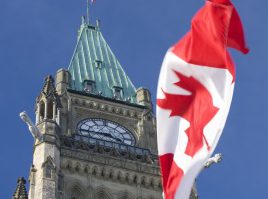
[ad_1]
A series of proposed changes to Canada’s tax system aimed at closing loopholes frequently exploited by the richest Canadians would end up penalizing the small- and medium-sized business (SMB) owners and entrepreneurs who serve as the backbone of Canada’s innovation economy, one of the country’s leading technology industry groups says.
According to Paul Labarge, a member of the Canadian Advanced Technology Alliance (CATA) Innovation Leadership Council and co-founder and partner of Ottawa law firm Labarge Weinstein, the changes would functionally see the CRA treating entrepreneur and employee earnings exactly the same way every tax season, with no accounting for either the increased risk experienced by business owners, or the greater resources enjoyed by enterprise and government employees.

“As written, the legislation relates to ‘Canadian private companies,’” he says. “Virtually every startup is a Canadian private company. Most of the tax revenue in this country is from private companies. But more importantly, entrepreneurs always start as private companies, and the legislation doesn’t account for how many of those people – and I can tell you, because I’m dopey enough to invest in some of them – don’t succeed, and end up with debts they carry for years.”
That risk is a key reason many of the so-called “loopholes” the government aims to close were created in the first place, Labarge says: They were meant to serve as a reward for the companies that do succeed.
More importantly, he says, the government appears to be arguing for the changes based on an observation that the richest Canadians – including successful business owners – accumulate their wealth through more diversified, and often less easily taxed, means, while assuming that all employees accumulate wealth in a more straightforward and similar fashion, which isn’t true.
“If you look at the position of small business owners, none of them have access to a pension structure that resembles in any way what’s available to government or large corporate employees,” Labarge says. “It’s simply not available.”
“If you’re going to say we must tax these people because they’re accumulating money at a different rate, then you have to look at it on a holistic basis and ask if we’re actually treating everybody fairly across the board in terms of their ability to accumulate funds for their retirement,” he continues. “And that’s not the case.”
The government’s pitch
Announced in July by finance minister Bill Morneau, with feedback due October 2, the changes have been framed by the federal government as an amendment to existing rules that would prevent the richest Canadians from “unfairly exploiting” rules designed to help businesses grow and ensure that people of similar income levels pay similar amounts of taxes.
In a July 18 statement regarding the proposed changes, Morneau also said the federal government would ensure that business owners could still take advantage of those rules:
“We know that businesses, including small businesses, help grow the Canadian economy,” he said. “These tax advantages are in place to help these businesses reinvest and grow, find new customers, buy new equipment and hire more people. We want to make sure those rules are used to do just that, and not to give unfair tax advantages to certain – often high-income – individuals.”
Labarge says that while predicating the changes on Canadians paying their fair share is a great concept in theory, it ignores the maxim in law that he who seeks equity must practice equity – and SMB owners and employees, to say nothing of enterprise and government employees, hardly stand on equal playing fields.
“If you’re a small business owner, you’re the last guy to get paid, and if there’s a defecit, guess who eats it?” he says. “How can you say that person should be taxed the same as an employee who not only gets paid, but has the right to force his pay from your assets if you’re the business owner?”
Parting words
In an Aug. 22 statement, Labarge also called the government’s terms for submissions regarding the proposed changes – that it will not consider any submissions related to the underlying principles – “a mockery of the process and the integrity of the department.”
In the same statement, CATA CEO John Reid called the proposed legislation “a wholesale attack on small business, including high tech startups, a sector the government is supposedly working to boost.”
After all, SMBs hardly represent a niche segment in the Canadian economy, Reid noted: According to CATA, more than 1 million registered businesses are SMBs, representing 98 per cent of all businesses across the country. Such companies employ almost half of Canada’s workforce and represent more than 40 per cent of its private sector economy.
The changes could also hurt Canada’s already-middling reputation for innovation, since many of our brightest entrepreneurs could simply look at the new rules and decide to take their business elsewhere, Lebarge warns.
“And they’re not going to go from Quebec to Ontario,” he says. “They’re just going to leave.”
[ad_2]
Source link
Share This Story, Choose Your Platform!
Related Posts
Recent Posts
- The government grant landscape is changing; how does IT fit in?
- The government wants CATA’s advice on how to improve SR&ED funding
- Impact of COVID-19 on the SR&ED Tax Credit
- Everything you must know about scientific research and experimental growth
- As Liberals tout ‘innovation agenda,’ CRA keeps scaling back SR&ED credits: CATA


